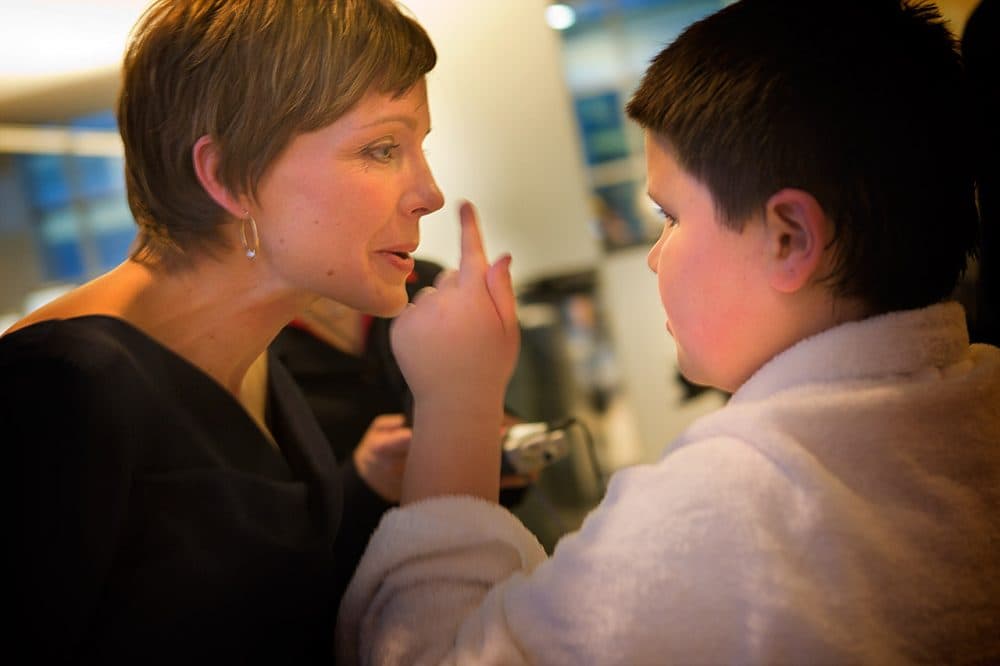Advertisement
The Genetics Of Autism: Inside The Brains Of The Supple Boys
Don't miss Lynn Jolicoeur's excellent piece on WBUR this morning about the genetics of autism and the two young Natick boys, Tommy and Stuart Supple, whose gene mutations are the focus of research by Stanford neuroscientist Dr. Thomas Sudhof.

From Lynn's story:
...The Stanford University neuroscientist — who this year shared the Nobel Prize in medicine for his decades of study into how brain cells communicate — has been studying Tommy and Stuart’s genes, specifically an alteration in one gene, for five years. The Supples hosted Sudhof Wednesday night at a Boston fundraiser in support of his research into the functioning of brain synapses in autism...
According to the Supples, Sudhof’s work is helping conquer the “defeatism” surrounding the neurocognitive disorder.
“He doesn’t think this is unknowable at all. He thinks that it’s very knowable,” Kate Supple said. “We all put so much time and effort into dealing with the symptoms of autism. But you also have to look to deal with the underlying disease.”
For many parents of children with autism, the disorder is a mystery. They have no idea what caused it and focus on therapies to help address the symptoms. But after the blow of both boys being diagnosed before their 2nd birthdays, the Supples sought out private genetic testing without the encouragement of their doctors.
“It did seem to Kate and I very odd that with no history of autism in either family, all of a sudden we went two for two in the autism lottery,” Chris Supple recalled. “And we kind of thought, ‘Why isn’t there any medical curiosity about this?’ ”
The testing revealed both boys have a mutation – or alteration as their parents prefer to call it — in a gene known as neuroligin 4, which produces a protein critical to communication between neurons.
The Supples went looking for researchers studying that type of gene and found a team led by Sudhof. In 2009, he and his colleagues published a journal article concluding the genetic alteration caused of the brothers’ autism. But they’re still working to determine how and why.
“We know a lot of genes where alterations in the genes predispose to autism,” Sudhof explained to the audience at the fundraiser. “But we don’t know how these alterations actually cause the behavioral impairments that we see.”
And researchers don’t know if all cases of autism are caused by a genetic defect, or why it affects only some cognitive functioning while motor function, for example, remains intact.
“Here what we have is a selective change in parts of what the brain does, but most of the brain works perfectly well,” Sudhof said.
Scientists do know the same genetic alteration can cause very different symptoms, even in siblings.
Stuart, the older but smaller of the two brothers, can speak. But he’s still very limited in how he communicates.
“Please, wanna go in the white van?” he asks his mother, referring to the van that takes him to school. He then announces enthusiastically, “The boys want to go to Storyland!” — a reference to the New Hampshire amusement park the family visited a few days prior.
Timmy is non-verbal and tends to wander the house searching for things to “get into,” as his mother says. He stops only briefly, for his father to push him in a mesh swing that hangs in a kitchen doorway and to ask for “t-t,” his word for tickles.
Sudhof’s research provides the Supples a much-needed cause for optimism, they said.
“The kids have a long life, and I’m not expecting any kind of cure or any major meds in the short term,” Kate Supple reflected. “But, you know, they’ll be around for 70 more years, and I know there’s going to be something in those 70 years that’s going to really change the biological basis and let them be able to care for themselves and go to some job that they enjoy. And I think that’s the promise of brain science and autism.”
This program aired on October 24, 2013. The audio for this program is not available.